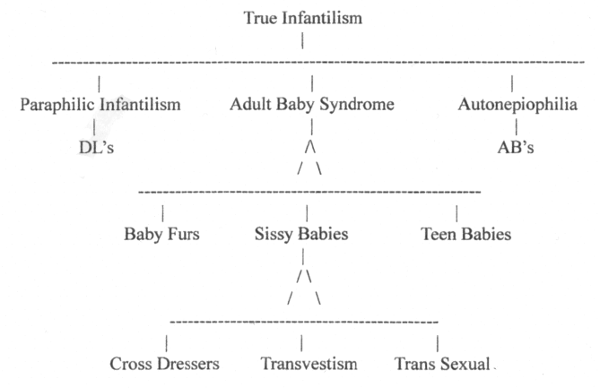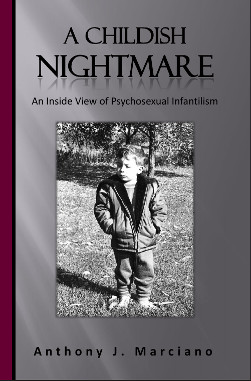
The tree diagram from page 17, used with permission.
Book by Anthony J. Marciano, review by BitterGrey

Based on the cover, one might wrongly assume that the terms psychosexual infantilism and paraphilic infantilism were being used interchangeably. Psychosexual infantilism refers to an incomplete progression through Freud's psychosexual stages - oral, anal, phallic, etc. - into heterosexuality. This etiology was once applied to a wide range of conditions which might not have involved diapers or babyhood at all. Paraphilic infantilism (or simply infantilism in most sources) refers to the desire to wear diapers and be treated as a baby. In the 80's, before paraphilic infantilism was formally defined, some sources used psychosexual infantilism to refer to it (eg Dr. Speaker's "Psychosexual Infantilism in Adults: The eroticization of regression"). Upon reading further, it becomes clear that "A Childish Nightmare" is in fact a book about a case of psychosexual infantilism without paraphilic infantilism. (Diapers do become involved later in Marciano's life, after contact with ABDLs.) That is, the term was used correctly on the cover.
The book opens with an overview chapter that is a mix of familiar and novel elements. For example, the table on page 3 is remarkably similar to the one in the 2005 version of the ABDL primer. (Please note that this is OK. When Wikipedia's paraphilic infantilism article was being rebuilt in 2006, the primer's content was donated towards the effort by the ABDL primer's author. Wikipedia's licensing permits free reuse, even without attribution.)
In contrast to the conventional table, there is the tree diagram on page 17. Paraphilic infantilism, usually associated with adult babies, is connected instead to diaper lovers. Another branch, adult baby syndrome, also doesn't include the adult babies. The adult babies are instead connected with "autonepiophiliaDEF," a MoneyismDEF that was initially defined by Dr. John Money as a diaper fetish (1984), and later as paraphilic infantilism (1986). In sexology, no categorization scheme is necessarily right or wrong. However, Marciano's novel arrangement could have benefited from more discussion.

These three branches of the tree diagram converge into "True Infantilism". This is probably not the best choice of wording: Marciano's book isn't yet another case of 'Your Infantilism Isn't True Infantilism.' While some ABDLs might draw comfort from proclaiming theirs to be the one true infantilism, there is medically no basis for defining any particular expression of infantilism to be true and all others false. In contrast, Marciano's "True Infantilism" is shown as an inclusive category, broader than paraphilic infantilism and including all ABDLs, but possibly narrower than psychosexual infantilism. "Undoubtedly, Infantilism does not present us with any black and white definitions; rather, it presents us with a seemingly infinite spectrum of various forms of behaviors." (page 3)
( Later in the book, on page 93, Marciano does judge a few ABDLs to be "posers." Correspondence with Marciano clarified that they were "faking the AB/DL lifestyle to gain temporary room and board," as opposed to people who really had an infantilism that wasn't True Infantilism.)
Marciano then goes on to discuss the causes of infantilism, drawing lightly from his own background. Given his claims to a photographic memory going back to six months of age, much more personal detail around this point would have been appreciated. He ties infantilism generally to events during Freud's anal stage. These events were troubling to the baby but not necessarily abusive, such as the arrival of a new sibling, being kept in diapers too long, etc. Of course, since such events are common, they would be present in the backgrounds of most people whether they were ABDL or not. These events would partially derail development, arresting part of the infantilist. Marciano's event was at around age three, which caused an emotional rift, which later developed into a Regressionary Identity Fixated Time (RIFT) of three and a half years. RIFTs are just one of many new concepts, terms, and acronyms introduced in the book.
The book also briefly mentions some assertions by others, such as Erotic Target Location Errors (ETLEs). ETLE contradicts the hypothesis of a more or less direct connection between infancy and infantilism. This was delineated in a correspondence with Marciano. "With regards to the ETLE concept, the objectification of actual children as sexual objects appears to be lacking when studied closely pertaining to the overall concept of infantilism in general. My research reveals the primary attraction to be focused on reclaiming the subconscious state of mind the individual experienced during a particular moment in childhood derived through the complex behavioral manifestation." However he also concedes: "Because no one theory applies to everyone or every condition, the autoerotic idea [ETLE] may hold some validity in only a very small number of case studies."
Overall, "A Childish Nightmare: An Inside View of Psychosexual Infantilism" seems well-intended, but the book shouldn't be picked up lightly. Marciano is clearly not a typical ABDL, and any readers expecting a book mainly about diapers will be disappointed. It can also be a difficult read, with many new terms and concepts, as well as some lapses of proofreading. However, it still might have merit. Wilhelm Stekel's 1952 book, "Patterns of Psychosexual Infantilism" is useful because it included a number of cases of paraphilic infantilism when many other books would have omitted them in favor of more populous categories of psychosexual infantilism, such as masochism. It is refreshing to see a 2013 psychosexual infantilism book that isn't pigeonholed into some populous or popular category.
Do you have Questions, tips, suggestions, or other feedback?